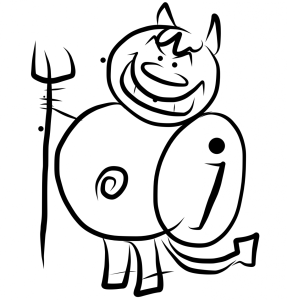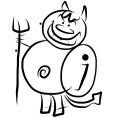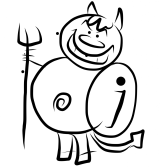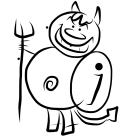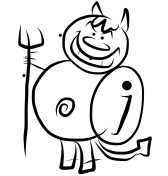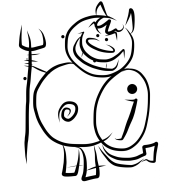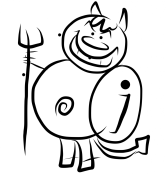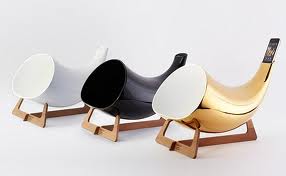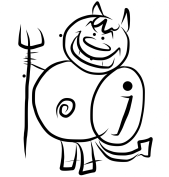The Soft Machine were never going to be an ordinary band. More influenced by jazz, poetry and pataphysics, rather than the blues and rock and roll, they were also one of the most singular bands of the 1966-7 psychedelic explosion. They might be more remembered now for pioneering jazz-rock, but originally Jazz was just one of the ingredients to their stew.
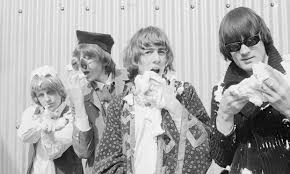
There was nothing normal about the original line-up of The Soft Machine. The whole set-up for a band was wrong, the lead singer, Robert Wyatt, was also the drummer. Daevid Allen, the lead guitarist, had a habit of breaking into performance poetry, while Kevin Ayres’ singing voice was deeper than his bass. Most remarkable of all was the organ, choosing a weedy Vox Continta, Mike Ratledge managed to boost the sound with some firey fuzz and a deliberately atonal approach that avoided blues phrases with something approaching contempt. As Ratledge himself said: ‘I didn’t see why guitarists had to have a monopoly on fuzz boxes.’
The bands roots lie in The Daevid Allen Trio, a performance poetry and free-jazz group that was spectacularly unsuccessful. In May 1963 they managed to complete just three nights of a three month residency at Peter Cook’s hip Establishment Club, before their mix of atonal guitar, surreal beat poetry, and drum-kit made from old bits of junk had outstayed their welcome. Apart from Daevid Allen, the band consisted of Robert Wyatt, on old bits of junk, and future Soft Machine bassist Hugh Hopper on bass. On occasion they were also joined by Mike Ratledge on piano..
The band had come together when wandering Australian beatnik Daevid Allen had ended up in Wyatt’s parents’ house, via Paris where he had stayed at the Beat Hotel working with the writer William Burroughs and the minimalist composer Terry Riley.
The house was quite bohemian for the time and had become a focal point for the local teenage Jazz fans, like Hugh Hopper and his brother Brian and Mike Ratledge. Kevin Ayres – the only other long hair in Kent (© Robert Wyatt) – although not a jazz fan also was a regular visitor. However, the arrival of Allen was seismic, as Ratledge remembered it in Mike King’s Wrong Movements: A Robert Wyatt History:
‘Daevid had been around a bit and was a fantastic influence in Canterbury at that time. He had moved into Robert’s house when we were all fifteen or sixteen, he was a friend of Robert’s mother and brought about two hundred jazz records and turned everybody in Canterbury on to them… early Mingus things. I don’t know what would have happened without them’

After the failure of the trio, Allen went to Deya with his partner Gilli Smyth. In his absence Wyatt along with the Hopper brothers, Richard Sinclair and Kevin Ayres formed The Wilde Flowers. This was a beat group, but rather than just rely solely on covers they wrote their own material (normally supplied by Ayres or the Hoppers), and also more importantly they played their sets as a continuous piece. Brian Hopper in Wrong Movements:
‘We also pioneered the continuous set idea early on… The concept was revolutionary at the time. It sure tested the keenness of the dancers.’
The Wilde Flowers were to undergo many line-up changes in its existence, and eventually also spawn Caravan as well as The Soft Machine. In 1966 Ayres who had left the band visited Allen in Deya. It was this event that lead to the formation of The Soft Machine.
During the visit Allen had an LSD vision in which he saw his entire future life mapped out before him. In his Autobiography he wrote about it at length:
‘I am a figure of focus on a wide stage lit by light towers. A large rock festival audience stretches far and wide. I am overwhelmed with the warmth of the applause… the connection between souls… the QUALITY of intense LOVE. Looking up I see with psychic vision an enormous luminous cone of etheric light which is simultaneously drawing astral shadows up from deep below us and dissolving them in the down pouring radiance focused at its peak. As I look out into the audience I see the same light sparkling sweetly in their eyes.’
He was also introduced to the possibility of rock & roll by the Yardbird’s singles that Ayres had bought with him. Especially ‘Still I’m Sad’ with its echoes of Gregorian Chant. Previously he had loathed rock and roll. His influences were the avant-garde jazz of Sun Ra and Ornette Coleman. He also saw himself far more as a poet than a musician at the time, but suitably open minded to the new possibilities afforded in mid-sixties pop, Ayres and Allen set to work creating a band.
They were soon to find funding for the project from an unlikely source. Wes Brunson was a tripped out optometrist from Oklahoma, who believed he was on a mission from God. Allen and Ayres band was going to be part of the mission.
They returned to the UK and recruited Wyatt and Rateledge. After briefly experimenting as a five piece under the name of Mister Head, and featuring a Californian by the name of Larry Nolan, the band soon settled as on the name The Soft Machine (taken from The William Burroughs novel), and made their debut as a quartet at the launch for International Times newspaper at the Roundhouse in London.
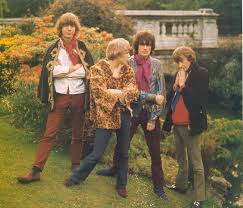
They performed with The Pink Floyd, who got paid £15 as opposed to The Soft Machine’s £12/10, because they had a light show and The Soft Machine didn’t. It was an arresting debut nevertheless. Featuring a miked up motorbike, which would be revved-up during gig to provide some nice concrete sounds, they also featured a Fluxus artist.
In his autobiography Daevid Allen, Gong Dreaming part 1, remembers it like this.
‘Halfway through the set we were to stop so that a Japanese woman artist could conduct a “Happening”. She came on stage and the entire enclosure was plunged into darkness.
“Touch the person next to you…” were her instructions, and then the lights came on and we continued.
This was my first encounter with Yoko Ono.’
The band certainly made impression. Mick Farren in ‘Give The Anarchist a Cigarette’ remembers them as ‘loosely jazz-based, and with an amazing drummer they were a quantum leap beyond anything I’d heard in rock & roll.’ While Farren could position The Pink Floyd in a rock and roll context, ‘they sounded like a continuous Pete Townsend guitar solo’, The Soft Machine were bringing elements of art, poetry, concrete sound. ‘Their breaking away from the current norms, and open-ended improvisation, gave me hope. If they could amplify a motorcycle, surely my weird-ass atonal singing could find its place.’
One of the key influences on the band at the time was French playwright and novelist Alfred Jarry’s quasi-science of Pataphysics. Jarry, who had died in 1907, was a great influence on the continent. The Dadaists and the Surrealists were directly influenced by his work. There were even a group of writers and artist which had fashioned a semi-serious College of Pataphysics. However, in the UK he was little known until the mid-sixties.
Like Alastair Crowley, he was a man from a previous generation whose ideas were to gain popularity within the psychedelic underground. Pataphysics, at its most basic level says if you whack two opposites together you create something new. Which is precisely what The Soft Machine, and many others, were doing.
Their debut at the Roundhouse also caught the eye of Paul McCartney, who was interested enough to try and work with Daevid Allen on a piece of Musique Concrete. Allen had been making tape-loops since the early sixties, so the band had the drop on The Beatles by almost half a decade. Also you have got to wonder where that Pataphysical quote in ‘Maxwell’s Silver Hammer’ might have come from.
Pop maverick and future Runaways manager,Kim Fowley, also caught their set and was impressed enough to convince Chas Chandler and Mike Jefferies, the bands management, to let him record their debut single.
Fowley took the band into CBS studios in December and January 1967 to record. The A-side was to be Allen’s Fred the Fish, backed with Ayres ‘Feelin’, Reelin’, Squeelin’’. The A-side was a lysergic Goonish ode. Imagine Lewis Carroll leading some trad. jazzers deep into the Australian bush. Despite featuring a great kazoo solo from Wyatt, Chandler decided not to use it. Wyatt has quite famously said that Chandler had always been looking for Slade, so he must have been bemused by Fred the Fish at the very least.
Long believed lost, it eventually turned up on ‘The Daevid Allen Trio Live 1963’ (Voiceprint VP122)
He kept the B-side and recorded Ayres’ ‘Love Makes Sweet Music’ as the A-side.
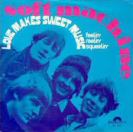 ‘I wrote [it] in Hamburg when we were all staying in toilets’ Ayres has said of the song in Wrong Movements. ‘And I got really excited about it and said to everybody “listen to this, we’ve got a big hit here.” I thought suddenly everything was going to change, that this song was the one to do it.’ It didn’t.
‘I wrote [it] in Hamburg when we were all staying in toilets’ Ayres has said of the song in Wrong Movements. ‘And I got really excited about it and said to everybody “listen to this, we’ve got a big hit here.” I thought suddenly everything was going to change, that this song was the one to do it.’ It didn’t.
Despite being a fast paced jazzy tune with an unusual structure, the song failed. It is hard to see why. The chorus is catchy, and Wyatt’s singing although very English, is also very soulful. It swings far better than any other single of the period, and is driven along by a monumental bass riff.
However, if the A-side was a bid for the mainstream, the Fowley produced flip was something else. Extraordinary even today, it sounds like PIL crashing head long into the Move. Its verses feature Ayres intoning deeply over a two note bass riff, before the song explodes into an upbeat pop chorus, repeat once and descend into chaos.
Both tracks have now been added as bonuses to the bands debut album ‘The Soft Machine’ (Polydor 532 050-5)
The Soft Machine, with their aggressive sound, and performance poetry were miles away from the love beads and flowers image normally associated with the late sixties. Pearce Marchbank has said of the band in Jonathan Green’s seminal history of the sixties underground Days in the Life:
‘I never really like the hippie ethos… The Velvet Underground were obviously far better… They were clean, New York, hard-edged. The Soft Machine were the same. Mike Ratledge in his long leather coat’.
Despite the failure of the single, now swathed in Mark Boyle’s light show, the band were becoming a popular attraction at clubs such as the UFO and The Speakeasy. Playing only original material, either by the band members, or of old Wilde Flowers tunes from Brian and Hugh Hopper, they were starting to get noticed. There is footage on Youtube, filmed for an Italian television programme, showing the band playing an extended freakout on Hugh Hopper’s track ‘I Should Have Known.’ Simultaneously, poppy and exploratory, with Allen playing a free improvisation penny-whistle solo over a Wyatt drum solo, while the audience dance on delighted.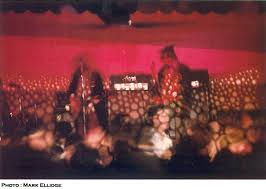
The footage also gives a brief insight into the Soft’s at home. The whole band were at this point living and rehearsing at Wyatt’s mothers house in West Dulwich, along with associated wives girlfriends and children.
However, the strain of having four members each with different ideas of what the music should sound like and all living in each others pockets was beginning to tell. Wyatt in particular was becoming increasingly disenchanted with Allen’s free-jazz and poetry approach. There is further footage of the Soft Machine playing at UFO. It is a performance poem for UFO and IT’s co-founder John ‘Hoppy’ Hopkins, who had just been arrested for possession of marijuana. Backed by some furious and heavy improvisation, it is angry and discordant. Certainly powerful as art, you can see why Joe Boyd has written of finding Allen’s style hectoring. The footage can be viewed online at Youtube. It is also available on the Gong DVD, Montserrat 1973 on Voiceprint.
Around mid April, the band entered the studio again to record some LP demo’s with Giorgio Gomlesky. Unfortunately, for one reason and another, the plug was pulled after three days. The recordings have been released under various different names, by a multitude of labels over the years, normally as Jet Propelled Photographs.
It is quite disappointing that the demo’s don’t really display any of the attributes that made The Soft Machine such a compelling live act. Mike Ratledge’s organ has none of its fuzz tone fierceness. Allen’s playing veers from charmingly quirky, to outright atonality. However, Wyatt, and Ayres make a fantastic rhythm section, and Wyatt’s drumming show him to be one of the best drummers of his era. His vocals are as fantastic as well. Despite only stretching out on one track, and there being a slight feeling of a wasted opportunity, the demo’s charm the listener. Which would have been a surprise possibly for their audience at the time.
After the failure of the demos to do anything, the band were back in the studio to record the follow up to Love Make Sweet Music. ‘She’s Gone.’ Was another Ayres tune, a version of it can also be found on ‘Jet Propelled Photographs’ although it dates right back to The Wilde Flowers. Another inverted Pop song along the lines of ‘Love Makes Sweet Music’. Starting with a brief piano introduction from Ratledge, it swiftly turns into a dense ball of sound, that despite its boy meets girl lyric is strangely menacing. Once again the structure is odd, the guitar solo appears and disappears as if from thin air. William Burroughs also makes a brief cameo. You might not be able to dance to it, but it certainly catches the attention. The B-Side, a version of ‘I Should Have Known’ is almost conventional by Soft Machine standards. Truncated from its extended freakout as it was played live, it delivers as a great dancefloor slice of beat.
‘She’s Gone’ eventually found a release on Harvest’s Triple Echo. Three LP boxset from 1977. It can now be more easily acquired on the companion CD to Joe Boyd’s Autobiography ‘White Bicycles’ on Fledgling. ‘I Should Have Known’ has also turned up on ‘The Soft Machine Turns On Volume One’ on Voiceprint.
There was also, previous to this, an aborted attempt to record a pair of Ayres’ tunes. ‘Television Dream’ and ‘What’s the Use of Tryin’. So far neither tune has been turned up, either on an official release or bootleg. It could be possible that they were alternative names for ‘She’s Gone,’ and ‘I Should Have Known’.
With tensions seething and egos rampant, the quartet entered into its final stage. In July they headed to the South of France to play in a portable disco.
Designed by Blur singer Damon Alban’s father Keith, the tent which was meant to hold happenings, a light show and The Soft Machine, was quickly banned by the Mayor of St. Tropez.
‘We only played there five times’ remembered Daevid Allen in Wrong Movements, ‘ They found the music was too loud and there were a lot of complaints from people.’
The Soft Machine then found themselves as the opening act for a Picasso play ‘Desire Caught By The Tail.’ They were quickly becoming popular, and the French approach to the arts seemed to suit the band far better than the situation in England. They were being treated seriously, the American jazz journal Downbeat featured an article on the band.
‘There is a great tradition to France of listening to music and dealing with the arts that is completely conductive to the creation of and appreciation of the sort of avant-garde set-ups that we dealt in. Plus a whole avant-garde theatre tradition, Jarry was French after all.’ Wyatt remembered, once again from, Wrong Movements: ‘You could really stretch out in front of a French audience, you almost had to apologize for it in England.’
They were certainly stretching out. At one gig they played their two note Zen chant ‘We Did it Again,’ (think ‘You Really Got Me’ only more reductive). ‘We played it for forty minutes to an ecstatic ‘in’ crowd who instantly decided that we were to be the fashionable flavour of the month.’ Allen remembered in Gong Dreaming.
While they finally getting the respect they deserved the relationships within the band were becoming more taught. After one bad gig Wyatt told Allen that he was ‘embarrassed to be musically associated with him.’ It was a shock, took Allen along time to recover from. However, the situation was soon to be resolved when Allen was refused entry back into England.
He had overstayed his visa, and with the UK customs spotting a undesirable longhaired layabout it was back to France for Allen. However, it was there that Allen found himself slap bang in the middle of the 1968 Student Riots which became one of the catalysts for his band Gong.
With Allen barred from the country the first phase of The Soft Machine ended. The band continued as a trio and slowly formed into the pioneering jazz-rock group. However, without Allen’s waywardness some of the dangerous unpredictability went. For a brief period The Soft Machine brought influences gathered from French Theatre, avant-garde jazz and performance poetry, to the UK rock scene and widened its scope immeasurably.

